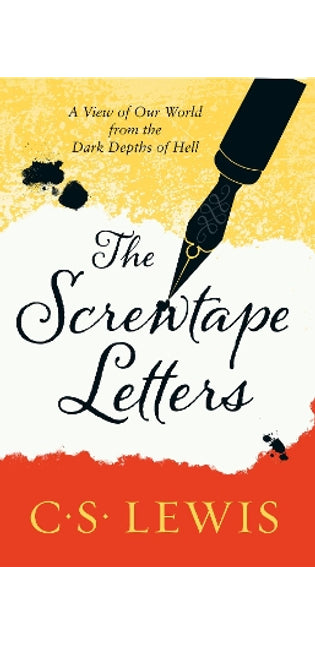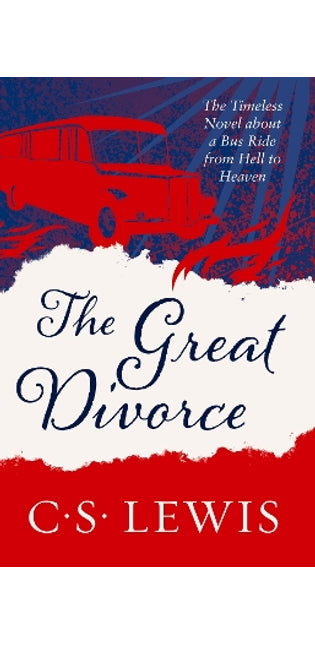C. S. Lewis
C. S. Lewis was a British literary scholar and author, having written more than 30 books attracting thousands of new readers every year. He is best known for The Chronicles of Narnia series and his religious works including The Screwtape Letters, Miracles and The Problem of Pain.

Mere Christianity
One of the most popular and beloved introductions to the concept of faith ever written, ‘Mere Christianity’ has sold millions of copies worldwide. The book brings together C.S. Lewis’s legendary radio broadcasts during the war years, in which he set out simply to ‘explain and defend the belief that has been common to nearly all Christians at all times’. Rejecting the boundaries that divide Christianity’s many denominations, ‘Mere Christianity’ provides an unequalled opportunity for believers and nonbelievers alike to absorb a powerful, rational case for the Christian faith.
R 310.00

Problem of Pain
For centuries people have been tormented by one question above all – ‘If God is good and all-powerful, why does he allow his creatures to suffer pain?’ And what of the suffering of animals, who neither deserve pain nor can be improved by it? The greatest Christian thinker of our time sets out to disentangle this knotty issue. With his signature wealth of compassion and insight, C.S. Lewis offers answers to these crucial questions and shares his hope and wisdom to help heal a world hungry for a true understanding of human nature.
R 310.00

Screwtape Letters
A milestone in the history of popular theology, ‘The Screwtape Letters’ is an iconic classic on spiritual warfare and the power of the devil. This profound and striking narrative takes the form of a series of letters from Screwtape, a devil high in the Infernal Civil Service, to his nephew Wormwood, a junior colleague engaged in his first mission on earth trying to secure the damnation of a young man who has just become a Christian. Although the young man initially looks to be a willing victim, he changes his ways and is ‘lost’ to the young devil. Dedicated to Lewis’s friend and colleague J.R.R. Tolkien, ‘The Screwtape Letters’ is a timeless classic on spiritual conflict and the invisible realities which are part of our religious experience.
R 310.00

Great Divorce
C.S. Lewis’s dazzling allegory about heaven and hell – and the chasm fixed between them – is one of his most brilliantly imaginative tales, as he takes issue with the ideas in William Blake’s ‘The Marriage of Heaven and Hell’. In a dream, the narrator boards a bus on a drizzly afternoon and embarks on an incredible voyage through Heaven and Hell. He meets a host of supernatural beings far removed from his expectations, from the disgruntled, ghostly inhabitants of Hell to the angels and souls who dwell on the plains of Heaven. This powerful, exquisitely written fantasy is one of C.S. Lewis’s most enduring works of fiction and a profound meditation on good and evil.
R 310.00

Four Loves
C.S. Lewis’s famous work on the nature of love divides love into four categories: Affection, Friendship, Eros and Charity. The first three are loves which come naturally to the human race. Charity, however, the Gift-love of God, is divine in its source and expression, and without the sweetening grace of this supernatural love, the natural loves become distorted and even dangerous.
R 310.00

How to Pray
C. S. Lewis here offers wisdom and lessons that illuminate our private dialogue with God—prayer—in this collection drawn from the breadth of his writings. The revered teacher and bestselling author of such classic Christian works as Mere Christianity and The Screwtape Letters, C. S. Lewis here offers wisdom and lessons that illuminate our private dialogue with God—prayer—in this collection drawn from the breadth of his writings. C. S. Lewis’s insights on Christianity and his reflections on Christian life continue to guide us more than fifty years after his death. How to Pray showcases Lewis’s enduring wisdom on prayer and its place in our daily lives. Cultivated from his many essays, articles, and letters, as well as his classic works, How to Pray provides practical wisdom and instruction to help readers nurture their spiritual beliefs and embrace prayer in all its forms. While many people would like to speak to God, they often don’t know how to begin. Lewis guides them through the practice, illuminating the significance of prayer and why it is central to faith. A welcome addition to the C. S. Lewis canon, How to Pray offers a deeper understanding of our personal tradition of prayer, our faith, and what is means to be a Christian.
R 310.00

Weight of Glory
Selected from sermons delivered by C. S. Lewis during World War II, these nine addresses show the beloved author and theologian bringing hope and courage in a time of great doubt. Addressing some of the most difficult issues we face in our day-to-day lives, C.S. Lewis’s ardent and timeless words provide an unparalleled path to greater spiritual understanding. Considered by many to be Lewis’s finest sermon of all, and his most moving address, ‘The Weight of Glory’ extols a compassionate vision of Christianity an dincludes lucid and compelling discussions on faith. Also included in this volume are "Transposition," "On Forgiveness," "Why I Am Not a Pacifist," and "Learning in War-Time".
R 300.00

Reflections on the Psalms
C.S. Lewis’ moving theological work in which he considers the most poetic portions from Scripture and what they tell us about God, the Bible, and faith. ‘We delight to praise what we enjoy because the praise not merely expresses but completes the enjoyment; it is its appointed consummation’ In this wise and enlightening book, C. S. Lewis examines the Psalms. As Lewis divines the meaning behind these timeless poetic verses, he makes clear their significance in our daily lives, and reminds us of their power to illuminate moments of grace.
R 368.00

Till We Have Faces
Fascinated by the myth of Cupid and Psyche throughout his life, C. S. Lewis reimagines their story from the perspective of Psyche’s sister, Orual. ‘I saw well why the gods do not speak to us openly, nor let us answer . . . Why should they hear the babble that we think we mean? How can they meet us face to face till we have faces?’ Till We Have Faces is a brilliant examination of envy, betrayal, loss, blame, grief, guilt, and conversion. In this, his final – and most mature and masterful – novel, Lewis reminds us of our own fallibility and the role of a higher power in our lives.
R 368.00

Miracles
‘The central miracle asserted by Christians is the Incarnation. They say that God became Man. Every other miracle prepares the way for this, or results from this.’ This is the key statement of ‘Miracles’, in which C. S. Lewis shows that a Christian must not only accept but rejoice in miracles as a testimony of the unique personal involvement of God in his creation. Using his characteristic lucidity and wit to develop his argument, Lewis challenges the rationalists, agnostics and deists on their own grounds and provides a poetic and joyous affirmation that miracles really do occur in our everyday lives.
R 310.00

How to Be a Christian
How to Be a Christian brings together the best of Lewis’s insights on Christian practice and its expression in our daily lives. Cultivated from his many essays, articles, and letters, as well as his classic works. From the revered teacher and best-selling author of such classic Christian works as Mere Christianity and The Screwtape Letters comes a collection that gathers the best of C. S. Lewis’s practical advice on how to embody a Christian life. The most famous adherent and defender of Christianity in the twentieth century, C. S. Lewis has long influenced our perceptions and understanding of the faith. More than fifty years after his death, Lewis’s arguments remain extraordinarily persuasive because they originate from his deep insights into the Christian life itself. Only an intellectual of such profound faith could form such cogent and compelling reasons for its truth. By provoking readers to more carefully ponder their faith, How to Be a Christian can help readers forge a deeper understanding of their personal beliefs and what is means to be a Christian, and strengthen their profound relationship with God.
R 340.00

Christian Reflections
A collection of Lewis’s essays against ‘the new morality’ – a fine collection representing Lewis at his most brilliant. Published shortly after his death, aiming to make available some of his writings which were not at that time publicly accessible, and to counter the prevailing new morality of the sixties, ‘Christian Reflections’ gives a robust defence of the Christian Gospel. Now, fifty years later, when Christian communities are, in our own day, struggling to come to terms with a shifting morality, this little volume will be a comforting reminder of the never-changing truths of the faith. As ever, Lewis’s clear and eloquent mind gives plenty of food for thought, especially as he aims his intellectual ammunition at the modern myths still so prevalent in our post-modern culture.
R 310.00

Surprised by Joy
For many years an atheist, C. S. Lewis vividly describes the spiritual quest that convinced him of the truth and reality of Christianity, in his famous autobiography. “In the Trinity Term of 1929 I gave in, and admitted that God was God … perhaps the most dejected and reluctant convert in all England.” Thus Lewis describes memorably the crisis of his conversion. ‘Surprised by Joy’ reveals both that crisis and its momentous conclusion that would determine the shape of Lewis’s entire life.
R 310.00

Pilgrim’s Regress
One of C. S. Lewis’ works of fiction, or more specifically allegory, this book is clearly modelled upon Bunyan’s Pilgrim’s Progress, as Lewis cleverly satirizes different sections of the Church. Written within a year of Lewis’ conversion, it characterises the various theological and temperamental leanings of the time. This brilliant and biting allegory has lost none of its freshness and theological profundity, as the pilgrims pass the City of Claptrap, the tableland of the High Anglicans and the far-off marsh of the Theosophists. As ever, Lewis says memorably in brief what would otherwise have demanded a full-length philosophy of religion.
R 340.00

Compelling Reason
‘You can only find out the rights and wrongs by Reasoning – never by being rude about your opponent’s psychology.’ For C. S. Lewis, reason and logic are the sensible way to approach faith and ethics. Much of the 20th century’s ills are caused by ill-founded beliefs and opinions. Lewis’s original approach remains as vital today as ever. He is able to take the most convoluted subject, turn it side on and shed bright illumination on it. To be able to see along things rather than at them – just like a beam of sunlight that invades the darkness of a toolshed – is, to Lewis, the way to understanding. Written variously between 1940 and 1962, this collection of essays represents the best of Lewis’s considerable wisdom on the great ethical and theological concerns of the day.
R 300.00


















